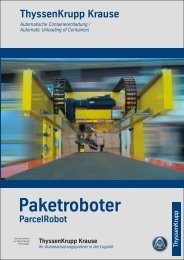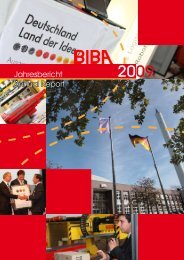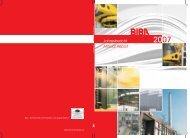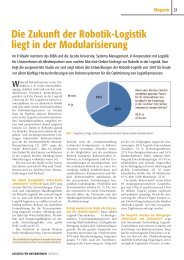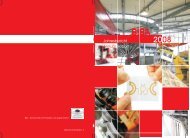Jahresbericht 2006 - Biba - Universität Bremen
Jahresbericht 2006 - Biba - Universität Bremen
Jahresbericht 2006 - Biba - Universität Bremen
Erfolgreiche ePaper selbst erstellen
Machen Sie aus Ihren PDF Publikationen ein blätterbares Flipbook mit unserer einzigartigen Google optimierten e-Paper Software.
xxx<br />
Einsatzmöglichkeiten und Potentiale<br />
von RFID in der Logistik<br />
kleiner und mittlerer Industrieunternehmen<br />
82 Prozent der befragten<br />
Unternehmen<br />
können sich vorstellen,<br />
künftig RFID-Technik<br />
zu implementieren.<br />
By using Radio Frequency Identification<br />
Devices (RFID), internal procedures<br />
can be optimised. This is where the project<br />
EmPoR (application possibilities and<br />
potential of RFID technology in the logistics<br />
of small and medium-sized enterprises)<br />
comes into action. Amongst others,<br />
the BIBA research divisions IPS (Intelligent<br />
Production and Logistics Systems) and<br />
MAQ (Metrology, Automation and Quality<br />
Science) worked on this project.<br />
The challenge was to develop a study<br />
on the status quo in SMEs, to ascertain the<br />
added value of SMEs through the application<br />
of the RFID technology, as well as<br />
to determine the existing obstacles during<br />
its introduction.<br />
Furthermore, an intersectoral catalogue<br />
of specifications was developed<br />
for the application of this technology in<br />
storage and production logistics. An economic<br />
calculation compares different<br />
identification systems (for example bar<br />
codes).<br />
The greatest obstructions for an overall<br />
introduction of RFID technology in SMEs<br />
are its acquisition costs, its implementation,<br />
as well as the operation of the<br />
system. Missing standards complicate the<br />
selection of a suitable system. There also<br />
is a lack of concepts for the application<br />
of this technology, as well as a lack of<br />
information concerning its added value.<br />
The bar code as an identification system<br />
is another reason why SMEs don’t want to<br />
change their system. EmPoR has, therefore,<br />
designed a planning guideline for<br />
the operation of RFID technology in logistics,<br />
performed an economic observation<br />
of automatic intentification technologies<br />
and also implemented and evaluated a<br />
pilot operation of the system in associated<br />
companies. New knowledge of the<br />
operation of RFID technology for mobile<br />
applications in logistics have also resulted<br />
in the assembly and operation of a<br />
research demonstrator.<br />
By introducing of the RFID technology,<br />
the added value and it‘s inherent obstacles<br />
could be derived from the status quo<br />
study. The study shows that SMEs ascribe a<br />
growing importance to the application of<br />
RFID technology. Therefore, 82 percent of<br />
the interviewed companies could visualise<br />
the implementation of this technology.<br />
However, the largest problems are still the<br />
high costs for the transponder (RFID tags:<br />
ID labels), as well as the additional RFID<br />
hardware.<br />
The result of this study is: the interviewed<br />
companies indeed recognize the<br />
potentials of RFID technology, but a better<br />
information policy would lead to more<br />
acceptance and higher investments in<br />
this sector. The result would be a higher<br />
turnover for transponders, whereby the tag<br />
costs per unit would decrease.<br />
Christian Gorldt<br />
7



